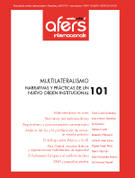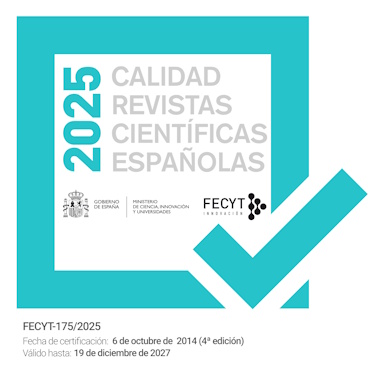Narratives of multilateralism: “Rashomon effect” and change of power
Keywords:
multilateralism,, power politics, hegemony, emerging countriesAbstract
Revista CIDOB d’Afers Internacionals, nº 101
Quadrimestral (April 2013)
ISSN:1133-6595 | E-ISSN:2013-035X
The effective multilateralism has become a commonplace feature in international political discourse. However, multilateralism is a puzzling concept and practice, and it is not conceived or interpreted in the same way by different international actors. While the United States continues to push “hegemonic multilateralism”, the EU is involved in “normative multilateralism”, the Global South has opted for “defensive multilateralism” and emerging countries promote “revisionist multilateralism”. They are all based on differentiated narratives, discursive legitimation, objectives and practices. The article attempts to characterize each of these reviews from their narratives and discursive logic. This argument used is the socalled “Rashomon effect”, based on the eponymous film by Akira Kurosawa, showing how different stories concerning a particular event can coexist, and how they establish the expectations, roles and behaviours of the actors involved. Finally, the article analyses how these narratives are affected by the process of power shift of the international system and calls for a common ground.
>> The full text articles of this issue are available only in Spanish language
References
Alden, C.; Morphet, S.; Vieira, M. A. The South in World Politics. Londres: Palgrave Macmillan, 2010.
Allison, G. Essence of Decision. Explaining the Cuban Missile Crisis. Nueva York: Little Brown, 1971.
Arenal, C. «Mundialización, creciente interdependencia y globalización en las relaciones internacionales». Cursos de Derecho Internacional y Relaciones Internacionales de Vitoria-Gasteiz 2008. Bilbao: Servicio de Publicaciones de la Universidad del País Vasco, 2009, p. 181-268.
Barbé, E. «Narrativa, identidad y relaciones internacionales: el caso del multilateralismo eficaz», en: Cardona, J. (coord.). Estudios de Derecho Internacional y de Derecho Europeo en Homenaje al Profesor Manuel Pérez González. Valencia: Tirant lo Blanch, 2012a, p. 1.733-1.753.
– «La UE en el contexto internacional, a la hora de las potencias emergentes», en: Barbé, E. Cambio mundial y gobernanza global. La interacción entre la Unión Europea y las instituciones internacionales. Madrid: Tecnos, 2012b, p. 46-66.
Barber, B. «La nueva “pax americana” y la tradicional política exterior». Estados Unidos. Imperio o poder hegemónico. La Vanguardia Dossier, n.º 7 (junio-septiembre 2003).
Barnett, M. y Duvall, R. (eds.). Power in global governance. Cambridge: Cambridge University Press, 2005.
Barsch, S, y Kohlmorgen, L. (2007) «The Role of Southern Actors in Global Governance: The Fight against HIV/AIDS». Working Papers, n.º 46 (marzo 2007). Hamburgo: German Institute of Global and Area Studies (GIGA).
Biskop, S. y Drieskens, E. «Effective Multilateralism and Collective Security: Empowering the UN». Working Paper, n.º 16 (2005). Lovaina: Institute for International and European Policy, University of Leuven, IIEB.
Brimmer, E. «Seeing blue. American visions of the EU». Chaillot paper, n.º 105 (septiembre 2007). París: Institute for Security Studies (ISS).
Brysk, A.; Parsons, C.; Sandholtz, W. «After Empire: National Identity and PostColonial Families of Nations». European Journal of International Relations, vol. 8, n.º 2 (2002), p. 267-305.
Carlsnaes, W. «Foreign Policy», en: Carlsnaes, W.; Risse, T.; Simmons, B. A. Handbook of International Relations. London: Sage, 2008, p. 331-349.
Castells, M. La era de la información: Economía, sociedad y cultura. Vol II. El poder de la identidad. México: Siglo xxi, 2000.
Comisión Europea. Communication from the Commission to the Council and the European Parliament: The European Union and the United Nations: The choice of multilateralism. Bruselas: COM (2003)526, 10 de septiembre de 2003.
Cooper, R. The Post-Modern State and the World Order. Londres: Demos, 2002.
Cox, R. «Multilateralism and World Orders». Review of International Studies, vol. 18, n.º 2 (abril 1992), p. 161-180.
– «Social Forces, States and World Orders: Beyond International Relations Theory», en: Cox, R. y Sinclair, T. Approaches to World Order. Cambridge: Cambridge University Press, 1996 [1981], p. 85-123.
Deutsch, K. W., et al. Political community and the North Atlantic area; international organization in the light of historical experience. Princeton: Princeton University Press, 1957.
Flanik, W. «Bringing FPA Back Home: Cognition, Constructivism and Conceptual Metaphor». Foreign Policy Analysis, vol. 7, n.º 4 (2011), p. 423-446.
Freres, C.; Gratius, S.; Mallo, T.; Pellicer, A. y Sanahuja, J. A. (eds.) (2007), ¿Sirve el diálogo político entre la Unión Europea y América Latina. Madrid: Fundación Carolina, Documento de Trabajo DT n.º 15.
Gnath. K. y Schmucker, C. The Role of the Emerging Countries in the G20: Agenda-setters, Veto Player or Spectator? Brujas: UNU-CRIS, El Colegio de Europa, 2012.
Groom, J. «Multilateralism as a way of life in Europe», en: Newman, E.; Takur, R. y Tirman, J. Multilateralism Under Challenge? Power; International Order and Structural Change.Tokyo: United Nations University Press, 2006, p. 460-480.
Hasenclever, A.; Mayer, P.; Rittberger, V. Theories of International Regimes. Cambridge: Cambridge University Press, 1997.
Heider, K. G. «The Rashomon Effect: When Etnographers Disagree». American Anthropologist, vol. 90, n.º 1 (marzo 1988), p. 73-81.
Held, D. La democracia y el orden global. Del Estado moderno al gobierno cosmopolita. Barcelona: Paidós, 1997.
– Un pacto global. La alternativa socialdemócrata al Consenso de Washington. Madrid: Taurus, 2005.
Hill, C. The Changing Politics of Foreign Policy. Basingstoke: Palgrave Macmillan, 2003.
Hill, C. y Wong, R. National and European Foreign Policies: Towards Europeanization. Londres: Routledge, 2011.
Holsti, K. «National Role Conceptions in the Study of Foreign Policy Analysis». International Studies Quarterly, n.º 14 (1970), p. 233-309.
Horowitz, I. L. «The Rashomon effect: ideological proclivities ad political dilemmas of the International Monetary Fund». Journal of Interamerican Studies and World Affairs, vol. 27, n.º 4 (invierno 1985), p. 37-55.
Houghton, D. «Reinvigorating the Study of Foreign Policy Analysis: Towards a Constructivist Approach». Foreign Policy Analysis, vol. 3, n.º 1 (2007), p. 24-45.
Hudson, V. M. Foreign Policy Analysis. Classic and Contemporary Theory. Nueva York: Rowan & Littlefield, 2007.
Jervis, R. Perception and Misperception in International Politics. Princeton: Princeton University Press, 1976.
Judt, T. Algo va mal. Madrid: Taurus, 2010. Kagan, R. Of Paradise and Power: America and Europe in the New World Order.
Nueva York: Alfred A. Knopf, 2003.
Lakoff, G. No pienses en un elefante. Lenguaje y debate político. Madrid: Editorial Complutense, 2007.
Lipset, S. M. American Exceptionalism: A Double-Edged Sword. Nueva York: W. W. Norton, 1997.
Lukes, S. Power: a Radical View. Londres: Palgrave Macmillan (2ª edición), 2005. Natorski, M. «El reconocimiento social de la UE en los marcos multilaterales: una potencia sui géneris en un mundo de Estados», en: Barbé, E. Cambio mundial y gobernanza global. La interacción entre la Unión Europea y las instituciones internacionales. Madrid: Tecnos, 2012, p. 67-85.
Newman, E. y Thakur, R. «Conclusions: Multilateralism under challenge or in crisis?», en: Newman, E.; Takur, R.; Tirman, J. Multilateralism Under Challenge? Power; International Order and Structural Change. Tokyo: United Nations University Press, 2006, p. 531-540.
Ortega, M. (ed.). «The European Union and the United Nations. Partners for Effective Multilateralism». Chaillot paper, n.º 78 (junio 2005). París: Institute for Security Studies (ISS).
– «Building the future. The EU’s contribution to global governance». Chaillot paper, n.º 100 (abril 2007). París: Institute for Security Studies (ISS).
Posen, A. S. «The reality and relevance of Japan’s Great Recession: Neither Ran nor Rashomon». Working paper series, 10-7 (junio 2010). Washington: Peterson Institute of International Economics.
Rodrik, D. «How Far Will International Economic Integration Go?». Journal of Economic Perspectives, vol. 14, n.º 1 (invierno 2000), p. 177-186.
– La paradoja de la globalización. Democracia y el futuro de la economía mundial. Barcelona: Antoni Bosch, 2011.
Roubini, N. Global imbalances:A contemporary ´Rashomon´ saga. Nueva York: Stern School of Business, New York University, noviembre 2006.
Rouquié, A. América Latina: Introducción al extremo Occidente. México: Siglo XXI, 1989.
Russell, R. y Tokatlian, G. «Nuevo orden internacional: Modelos de política exterior y opciones estratégicas. El caso de América Latina frente a Estados Unidos». Revista CIDOB d’Afers Internacionals, n.º 85-86 (2009), p. 211-249.
Sanahuja, J. A. «¿Un mundo unipolar, multipolar o apolar? El poder estructural y las transformaciones de la sociedad internacional contemporánea», en: VV AA.
Cursos de Derecho Internacional de Vitoria-Gasteiz 2007. Bilbao: Universidad del País Vasco, 2008, p. 297-384.
– «Desequilibrios globales: el impacto de la crisis en los países en desarrollo», en: Mesa, Manuela (coord.). Crisis y cambio en la sociedad global. Anuario 2009- 2010 del Centro de Educación e Investigación para la Paz (CEIPAZ). Madrid: CEIPAZ/Icaria, 2009, p. 27-62.
Schweller, R. y Pu, X. «After Unipolarity. China’s vision of International Order in an era of US decline». International Security, vol. 36, n.º 1 (verano 2011), p. 41-72.
Sen, A. Identidad y violencia. La ilusión del destino. Buenos Aires: Katz, 2007.
Serbin, Andrés. «Regionalismo y soberanía nacional en América Latina: los nuevo s desafíos», en: Rojas Aravena, Francisco (ed.). América Latina y el Caribe: multilateralismo vs. soberanía. La construcción de la Comunidad de Estados Latinoamericanos y Caribeños. Buenos Aires: Teseo/FLACSO, 2011, p. 49-98.
Snyder, R.; Bruck, H. W.; Sapin, B. Decision-Making as an Approach to the Study of International Politics. Glencoe: Free Press, 1954.
Suganami, H. «Agents, Structures, Narratives». European Journal of International Affairs, vol. 5, n.º 3 (1999), p. 365-386.
Tokatlian, J. G. «Latinoamérica y sus “alianzas” extrarregionales: entre el espejismo, la ilusión y la evidencia», en: Wollrad, Dörte; Maihold, Gunther; Mols, Manfred (eds.). La agenda internacional de América Latina: entre nuevas y viejas alianzas. Buenos Aires: Nueva Sociedad, 2011, p. 139-162.
Tooze, R. «Ideology, Knowledge and Power in International Relations and International Political Economy», en: Lawton, T.; Rosenau, J. y Verdun, A. (eds.). Strange Power. Shaping the parameters of international relations and international political economy. Aldershot: Ashgate, 2000, p. 187-189.
Torreblanca, J. I. «Cinco razones por las que Europa se resquebraja». El País Domingo (15 de mayo de 2011), p. 2-5.
– La fragmentación del poder europeo. Barcelona: Icaria/Política Exterior, 2011b. Unión Europea. Una Europa segura en un mundo mejor. Estrategia Europea de Seguridad. Bruselas, 12 de diciembre de 2003.
Weldes, J. (ed.). «Bureaucratic Politics: A Critical Constructivist Assessment». Mershon International Studies Review, vol. 42, n.º 2 (1998), p. 216-225.
Zakaria, F. The Post-American World. Nueva York: W. W. Norton & Company, 2008.













